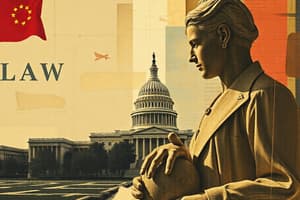Podcast
Questions and Answers
Which of the following is not considered an element of a contract?
Which of the following is not considered an element of a contract?
- Mens Rea (correct)
- Intention
- Offer
- Consideration
What is the primary role of a union in the context of labor law?
What is the primary role of a union in the context of labor law?
- To enforce laws against employers
- To negotiate better terms for workers (correct)
- To represent employers in disputes
- To manage workplace safety regulations
In the context of criminal law, what does 'Actus Reus' refer to?
In the context of criminal law, what does 'Actus Reus' refer to?
- The physical conduct involved in committing a crime (correct)
- The legal consequences of an action
- The intention behind a criminal act
- The justification for committing a crime
Which of the following rights is protected by Habeas Corpus?
Which of the following rights is protected by Habeas Corpus?
What type of incidents does the SIU investigate?
What type of incidents does the SIU investigate?
What is the primary function of law in society?
What is the primary function of law in society?
Which statement best differentiates between laws and rules?
Which statement best differentiates between laws and rules?
Which type of law primarily focuses on regulating the actions of government agencies?
Which type of law primarily focuses on regulating the actions of government agencies?
What distinguishes public law from private law?
What distinguishes public law from private law?
What role does the Supreme Court of Canada serve in the court system?
What role does the Supreme Court of Canada serve in the court system?
Which of the following best describes tort law?
Which of the following best describes tort law?
What is a crucial aspect of family law?
What is a crucial aspect of family law?
What was the significance of the Hammurabi Code in the development of law?
What was the significance of the Hammurabi Code in the development of law?
Which legal principle ensures that similar cases are decided consistently over time?
Which legal principle ensures that similar cases are decided consistently over time?
What significant change did the Constitution Act of 1982 bring to Canada's legal framework?
What significant change did the Constitution Act of 1982 bring to Canada's legal framework?
Which section of the Canadian Charter of Rights and Freedoms addresses the reasonable limits of rights?
Which section of the Canadian Charter of Rights and Freedoms addresses the reasonable limits of rights?
Indictable offenses in criminal law are characterized by which of the following?
Indictable offenses in criminal law are characterized by which of the following?
What is the primary purpose of the Oakes Test in Canadian law?
What is the primary purpose of the Oakes Test in Canadian law?
In the context of Canadian Criminal Law, what does 'mens rea' refer to?
In the context of Canadian Criminal Law, what does 'mens rea' refer to?
Which of the following documents is recognized for laying down fundamental principles regarding individual rights at the international level?
Which of the following documents is recognized for laying down fundamental principles regarding individual rights at the international level?
What does the term 'acta reus' signify in criminal law?
What does the term 'acta reus' signify in criminal law?
Which Canadian government level primarily handles law enforcement and local zoning issues?
Which Canadian government level primarily handles law enforcement and local zoning issues?
Which of the following is NOT a criterion considered in the Oakes Test?
Which of the following is NOT a criterion considered in the Oakes Test?
Which of the following rights is protected under Section 15 of the Canadian Charter of Rights and Freedoms?
Which of the following rights is protected under Section 15 of the Canadian Charter of Rights and Freedoms?
Which principle advocates for the concept of 'equal opportunities' in Ontario's legal framework?
Which principle advocates for the concept of 'equal opportunities' in Ontario's legal framework?
Which of these legal defenses claims that a defendant was induced to commit a crime by law enforcement?
Which of these legal defenses claims that a defendant was induced to commit a crime by law enforcement?
What role does the Governor General play in the law-making process in Canada?
What role does the Governor General play in the law-making process in Canada?
Flashcards
Mens Rea
Mens Rea
The intent or knowledge of committing a crime.
Actus Reus
Actus Reus
The physical conduct or act involved in the commission of a crime.
Bail
Bail
A temporary release from custody while awaiting trial.
Habeas Corpus
Habeas Corpus
Signup and view all the flashcards
SIU
SIU
Signup and view all the flashcards
What are laws?
What are laws?
Signup and view all the flashcards
What are rules?
What are rules?
Signup and view all the flashcards
What is constitutional law?
What is constitutional law?
Signup and view all the flashcards
What is administrative law?
What is administrative law?
Signup and view all the flashcards
What is criminal law?
What is criminal law?
Signup and view all the flashcards
What is tort law?
What is tort law?
Signup and view all the flashcards
What is public law?
What is public law?
Signup and view all the flashcards
What is private law?
What is private law?
Signup and view all the flashcards
Rule of Precedent (Stare Decisis)
Rule of Precedent (Stare Decisis)
Signup and view all the flashcards
Canadian Charter of Rights and Freedoms
Canadian Charter of Rights and Freedoms
Signup and view all the flashcards
Oakes Test
Oakes Test
Signup and view all the flashcards
Criminal Law
Criminal Law
Signup and view all the flashcards
Criminal Procedure
Criminal Procedure
Signup and view all the flashcards
Civil Law
Civil Law
Signup and view all the flashcards
Family Law
Family Law
Signup and view all the flashcards
Tort Law
Tort Law
Signup and view all the flashcards
Negligence
Negligence
Signup and view all the flashcards
Defamation
Defamation
Signup and view all the flashcards
Study Notes
Functions of Law
- Regulates society, ensuring fairness, resolving disputes, maintaining order, protecting freedoms, and delivering justice.
- Differs from rules, which are informal guidelines lacking legal consequences outside specific groups.
Types of Law
- Constitutional Law: Governs the relationship between government levels, protecting fundamental rights.
- Administrative Law: Regulates government agencies and officials, ensuring legal actions.
- Criminal Law: Deals with actions harmful to society, prescribing punishments.
- Tort Law: Addresses civil wrongs, compensating for harm.
- Labour Law: Governs employer-employee relationships, including unions and rights.
- Family Law: Covers family relationships, including marriage, divorce, and support.
- Contract Law: Governs legally binding agreements.
- Property Law: Concerns ownership and use of real and personal property.
- Environmental Law: Addresses environmental impact like pollution and conservation.
Public vs. Private Law
- Public Law: Concerns the individual-government relationship (criminal, constitutional, administrative).
- Private Law: Concerns disputes between private individuals or organizations (torts, contract, family).
Court System Structure
- Lower Courts: Handle minor offenses and civil disputes.
- Superior Courts: Handle serious cases and significant disputes.
- Appeal Courts: Review lower court decisions, interpreting the law.
- Supreme Court of Canada: Highest court, interpreting the Constitution and making final decisions.
History/Origins of Law
- Hammurabi Code: Early legal system focusing on justice.
- Mosaic Law: Based on Ten Commandments, forming the basis of Jewish law.
- Roman Law: Influenced modern law, particularly property and contract.
- Greek Law: Introduced democracy, citizenship rights, and trial by jury.
Rule of Precedent (Stare Decisis)
- Courts rely on past similar decisions for consistency and fairness.
Canada’s Constitution
- British North America Act (1867): Created Canada as a self-governing dominion.
- Constitution Act (1982): Brought the Constitution under Canadian control.
How a Bill Becomes a Law
- Proposed bill is debated, amended, and voted on in Parliament.
- Approved bill is signed by Governor General to become law.
Division of Powers
- Federal Government: Handles national matters (defense, immigration, criminal law).
- Provincial Governments: Deal with areas like education, healthcare, and property law.
- Municipal Governments: Handle local issues (zoning, policing, waste management).
Influences on Human Rights
- Magna Carta: Influenced constitutional law and human rights.
- American Bill of Rights: Influenced protection of individual rights.
- French Declaration of the Rights of Man & Citizen: Focused on liberty and equality.
- Universal Declaration of Human Rights (UDHR): Established a global standard.
Canadian Charter of Rights and Freedoms
- Section 1 - Reasonable Limits Clause: Rights can be limited in a free society.
- Section 2 - Fundamental Freedoms: Freedom of thought, belief, expression, etc.
- Sections 3-6 - Democratic and Mobility Rights: Voting, running for office, and moving.
- Sections 7-14 - Legal Rights: Right to life, liberty, security, fair trials.
- Section 15 - Equality Rights: Protection against discrimination.
- Sections 16-22 - Language Rights: Right to use English or French in federal institutions.
- Section 25 - Aboriginal Rights: Acknowledges Indigenous rights and traditions.
- Section 33 - Notwithstanding Clause: Allows governments to override certain Charter rights.
Oakes Case and Test
- Oakes Test: Determines if laws limiting Charter rights are justified. Considers pressing and substantial objective and proportionality.
Ontario Human Rights Code
- Protects against discrimination in employment, housing, services, providing equal opportunity.
Criminal Law
- Criminal vs. Civil Law: Criminal law involves offenses against the state, while civil law involves private disputes.
- Proof required: Criminal law requires "beyond a reasonable doubt," while civil law requires lesser proof.
- Types of Criminal Offenses: Indictable (serious crimes), Summary (minor offenses), Hybrid (both).
- Key Legal Terms: Actus Reus (physical act), Mens Rea (mental state).
- Parties to Offenses: Aiding, abetting, accessory after the fact.
- Courtroom Players: Judge, prosecutor, defense attorney, jury.
- Criminal Procedures: Arrest, search warrants, jury selection.
- Criminal Defenses: Self-defense, mental disorder, entrapment.
Sentencing
- Purposes: Punishment, rehabilitation, deterrence, justice.
- Sentencing is done only by the Judge, including Pre-Sentence Reports.
- Diversion Programs are alternative measures for minor offenders, like community service.
Youth Justice System
- Focused on rehabilitation and reform instead of punishment.
Prison System & Release
- Parole: Early release with conditions.
- Statutory Release: Automatic release after serving part of a sentence.
Civil Law
- Family Law: Covers marriage, divorce, child custody, support.
- Tort Law: Deals with negligence, defamation, and nuisance.
- Contract Law: Contains elements of offer, acceptance, consideration, and intention.
Important Terms
- Mens Rea: Criminal intent.
- Actus Reus: Physical conduct.
- Bail: Temporary release until trial.
- Habeas Corpus: Right to appear before a court if detained.
SIU (Special Investigations Unit)
- Civilian law enforcement agency investigating serious incidents involving police and civilians. Their jurisdiction is limited to those incidents resulting in serious injury, death, or sexual assault allegations involving police and civilians.
Studying That Suits You
Use AI to generate personalized quizzes and flashcards to suit your learning preferences.




